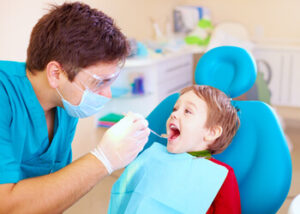Good dental health starts early. The dedication to educating children, along with parents, about preventative oral care is very important. With this, it is possible for children to grow up with only minimal or no dental problems. Much major dental work such as fillings and root canal therapy later in life can be avoided. Comprehensive dental care by an expert dentist can help your children maintain their happy smiles!
Comprehensive Dental Care – your child’s first appointment
You can bring your child along to your dental appointments such as a clean, so he or she can observe what it’s like to be in a dental chair. This way, he or she can get used to the sounds and the dental environment. Your child will come to learn that coming to the dentist is a harmless affair.
In subsequent appointments, your child can have a ride in the chair and become familiar with dental instruments and learn a few brushing techniques.
Your child’s first thorough check-up is usually at the age of 4 -5 unless he or she needs to be seen earlier due to any obvious dental concerns such as decay or dental injury. This visit is a comprehensive examination to assess the condition of his or her teeth and gums as well as the development of his or her jaw, facial skeletal growth and airways. Furthermore, it is a baseline documentation, to which future check-ups will be compared.
Comprehensive Dental Care – Oral hygiene instructions for kids
Babies/toddlers
Before the emergence of your child’s first tooth, it is recommended to wipe the gums with a wet gauze or a clean damp cloth daily to remove debris. When your baby gets his or her first tooth, he or she will be too small to brush, so you will have to do it. A tiny amount of baby toothpaste can be rubbed over the gums and teeth with a clean, small head soft toothbrush. When your baby shows interest in the toothbrush, let him/her hold it to get used to the sensation.
It’s up to you to instil good dental hygiene practices in your family and it’s a good idea to start when your children are very young. By brushing and flossing twice a day, limiting sugar intake and not allowing toddlers to fall asleep with a bottle or pacifier, you can do your part to manage dental decay in between visits to the dentist.
Between the ages of 3-9 approximately
Children lack the dexterity and often the motivation to brush their teeth. Therefore, it is up to you to supervise their brushing or help them brush their teeth.
Step 1: Allow your child to brush their teeth twice a day with toothpaste. Transition to a battery-operated electric toothbrush at the appropriate time.
 Step 2: Before bed, sit on the sofa with your child’s head in your lap. Dip the toothbrush in hot water and brush their teeth again, paying special attention to the tooth immediately above the gumline.
Step 2: Before bed, sit on the sofa with your child’s head in your lap. Dip the toothbrush in hot water and brush their teeth again, paying special attention to the tooth immediately above the gumline.
Step 3: Floss between the back teeth
Step 4: Apply Tooth Mousse, a product rich in minerals to strengthen enamel.
Comprehensive Dental Care – Importance of ongoing regular maintenance
Visit The Dentist Twice A Year – Checkup
It is recommended that your child visit the dentist every six months. As your child grows, he or she will go through many changes such as the development of his or her teeth, jaw, facial skeletal growth and airways. These need to be reassessed regularly so that problems can be picked up early and interventions can be recommended at the right time. If required, your child may be referred to specialists such as ENT, speech pathology and orthodontists.
Dental X-Rays
Your dental practitioner may recommend an x-ray at the appropriate time as the baby teeth fall out and the adult teeth emerge. Dental x-rays may also be helpful in the event that there is some tooth decay. They will also be used if it is suspected that your child may need orthodontic braces.
Professional Cleaning And Polishing
Our mouths are full of bacteria, and we can do our part to keep it under control by brushing and flossing. If we don’t do this, the bacteria can get out of control. They cling to the teeth in a sticky film, making a substance called plaque. Plaque can cause decay and it can harden to form a substance called calculus contributing to gum disease. Professional cleaning of your teeth helps to keep the bacterial load in your mouth under control.
Dental preventative resin restoration
A preventative resin restoration is a type of Tooth Coloured Filling, or composite resin, that is used to treat and prevent more decay in the fissures and grooves on the biting surface of molar teeth. Genetically, some people have teeth with have deep fissures that retain plaque bacteria. When this bacteria can’t be cleaned away this results in decay. Preventive Resin Restorations are a minimalist, non-invasive way of cleaning out the deep fissures by removing only the decay and the unhealthy tooth structure. The bonded composite resin is then placed as described above. The result is a more cleanable tooth surface. This is commonly used in kids or young adults, preferably soon after back teeth erupt and before too much decay sets in. It’s then a simple and very safe procedure that often requires no local anaesthetic.
Dental Fillings
Sometimes, despite our best efforts at oral health, bacteria can erode the surface of a tooth and start to decay it. If the decay is not removed, it will get worse and corrode a larger portion of the tooth. This can cause the decay to get very close to the nerve of the tooth, which may be very painful.
Sometimes, it may also cause an infection in the pulp of the tooth, which may need to be treated with a root canal treatment. Chips and cosmetic imperfections in the dental enamel can also be addressed.
If you do visit your dentist twice a year, you have a better chance of picking up tooth decay before it gets very bad, and your chances of having a smaller filling are better. Smaller fillings are quicker and cheaper to deal with, plus they maintain your tooth’s structural integrity much better. Maintaining general dental care gives you an early warning about potential problems.
Comprehensive Dental Care – Advice And Input
In the event that your child does need a filling, it presents an opportunity for your dental practitioner to talk to your child about comprehensive oral health and the importance of dental hygiene. Your child’s brushing and flossing technique may be reviewed and improvements suggested for oral care.
Having access to comprehensive dental advice is another important aspect of general dental care that can improve your child’s oral health.
To find out more about how comprehensive dental care can benefit your children’s dental health, please contact us at (02) 6188 7293.

